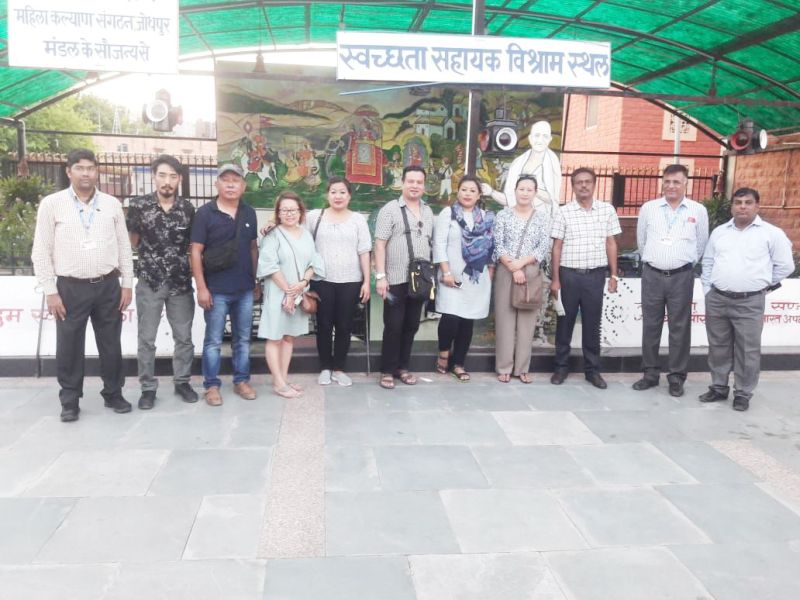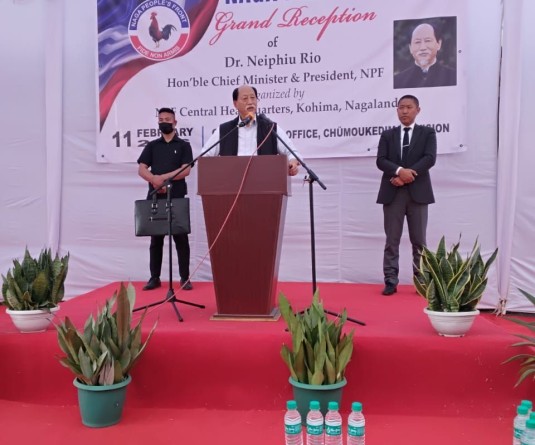How Jodhpur became India's cleanest Railway station

Journalists from Nagaland along with officials at Jodhpur Junction Railway Station. (Morung Photo)
Journalists from Nagaland on a Media Tour interact with
Chief Health Inspector of Jodhpur Junction Railway Station
Atono Tsükrü Kense
Kohima | September 22
Even though Dimapur railway station is known as the second busiest and highest revenue earner in the Northeast, it is plagued with unhygienic environment and lack of proper facilities for its passengers.
Jodhpur Junction Railway Station and Jaipur Railway Station of North Western Railway (NWR) have bagged the top two positions for being the cleanest stations in the country in an award earlier this month by the Union ministry of drinking water and sanitation.
Jodhpur bagged the first prize, and they were recognized and awarded for its measures for safe drinking water and sanitation. The award, it was informed were given following the survey conducted by the Quality Council of India (QCI) for Indian railways.
Journalists from Nagaland led by Deputy Director, PIB Imphal and in-charge of Kohima, Abdul Hamid who are on a Media Tour to Jodhpur and Jaisalmer interacted with the Chief Health Inspector of Jodhpur Junction Railways, SS Rajpurohit.
During the interaction, Rajpurohit revealed that following the ban on appointment of new cleanliness staff, the authorities decided to contract out the works to private bidders in 2007. In the process, the Central Government also launched the Swachh Bharat Mission, SBM.
The cleanliness and house-keeping contractor engaged for the Railway station while carrying out the works also implements the SBM, he said, adding that the consistent measures finally resulted in Jodhpur Railway Station being placed 187th position in 2016 under the survey conducted by Quality Council of India under the Ministry of Railways.
In 2017, it was placed 18th while finally in 2018 the Quality Council adjudged the Jodhpur Railway Station under North West Railways in the top position among the 407 stations surveyed by it.
Rajpurohit said that initially it was difficult for the JRS authorities and the contractors to create awareness amongst the general public, but continuous awareness campaigns at the various levels, as well as imposition of fine for open urination, defecation and spitting on walls helped in attaining the current status during the last tenure of the contract.
Each zone, he said, has one supervisor who strictly monitors the performance of the workers.
The entire station is put under CCTV surveillance, he said, adding that the fine collected from defaulters amounting to Rs 1,95,600 during the last four months May-August 2019 has been deposited to the government treasury, he said.
He said that the authorities have entered into new contract for cleanliness and sanitation drive for a period of 4 years at an amount of Rs 18 crore.
He revealed that the contractor has engaged 150 cleanliness staff, both male and female. They work in three shifts of eight hours each from morning 6AM. The women workers are engaged during the day time shifts while males work through the evening and night, he stated.
A total of 27 mechanised machines are used while the workers are provided with all forms of safety gears, including shelter house for them to rest and have food. A baby feeding room and child care room is also provided for mothers engaged in the work, he said, adding that the entire station is divided into three areas and workers divided accordingly.
He stated that the three cleaning supervisors records the activities of every shift while biometric attendance system is maintained for payment of wages to the workers.
This helps in consistency of work, Rajpurohit said.
Meanwhile, he also informed that along with the Jodhpur Development Authority, the railway authority is working towards completely banning single use plastics within its jurisdiction. The station with five platforms, has a total of 65 toilets.
The team of journalists was also guided to witness the cleanliness measures being undertaken in the toilets and waiting rooms of different classes within the station.
On the challenges faced during the campaign, Rajpurohit noted that the main challenge is creating awareness among the train passengers not to defecate while the train is standing on the station platforms.
It may be mentioned that the Railway Ministry has introduced bio-toilets but passengers have been throwing materials which block the toilets and create more problem.
Meanwhile, Principal Director General of IIMC, New Delhi Kuldeep Singh, Dhatwalia met the journalists at Indira Gandhi International Airport on September 21.




